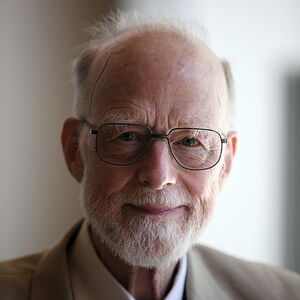Tony Hoare (nonfiction): Difference between revisions
Jump to navigation
Jump to search
No edit summary |
|||
| Line 3: | Line 3: | ||
He developed the sorting algorithm quicksort in 1959/1960. | He developed the sorting algorithm quicksort in 1959/1960. | ||
He also developed Hoare logic for verifying program correctness, and the formal language communicating sequential processes (CSP) to specify the interactions of concurrent processes (including the dining philosophers problem) and the inspiration for the occam programming language. | He also developed Hoare logic for verifying program correctness, and the formal language communicating sequential processes (CSP) to specify the interactions of concurrent processes (including the [[Dining philosophers problem (nonfiction)|dining philosophers problem]]) and the inspiration for the [[Occam programming language (nonfiction)|occam programming language]]. | ||
== In the News == | == In the News == | ||
<gallery | <gallery> | ||
File:John Ambrose Fleming in Fleming tube.jpg|link=John Ambrose Fleming|[[John Ambrose Fleming]] shares research data with Tony Hoare. | File:John Ambrose Fleming in Fleming tube.jpg|link=John Ambrose Fleming|[[John Ambrose Fleming]] shares research data with Tony Hoare. | ||
</gallery> | </gallery> | ||
== Fiction cross-reference == | == Fiction cross-reference == | ||
* [[Gnomon algorithm]] | |||
== Nonfiction cross-reference == | == Nonfiction cross-reference == | ||
* [[Computer science (nonfiction)]] | * [[Computer science (nonfiction)]] | ||
* [[Dining philosophers problem (nonfiction)]] | |||
* [[Occam programming language (nonfiction)]] | |||
External links: | External links: | ||
Revision as of 20:26, 22 June 2017
Sir Charles Antony Richard Hoare FRS FREng (born 11 January 1934), commonly known as Tony Hoare or C. A. R. Hoare, is a British computer scientist.
He developed the sorting algorithm quicksort in 1959/1960.
He also developed Hoare logic for verifying program correctness, and the formal language communicating sequential processes (CSP) to specify the interactions of concurrent processes (including the dining philosophers problem) and the inspiration for the occam programming language.
In the News
John Ambrose Fleming shares research data with Tony Hoare.
Fiction cross-reference
Nonfiction cross-reference
- Computer science (nonfiction)
- Dining philosophers problem (nonfiction)
- Occam programming language (nonfiction)
External links:
- Tony Hoare @ Wikipedia

